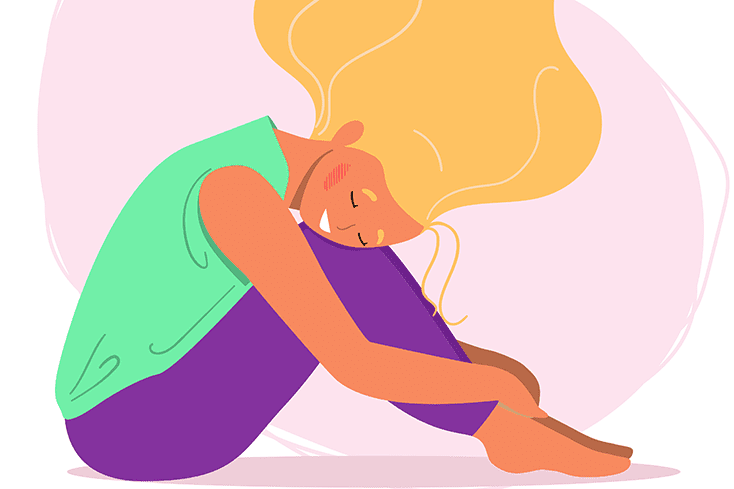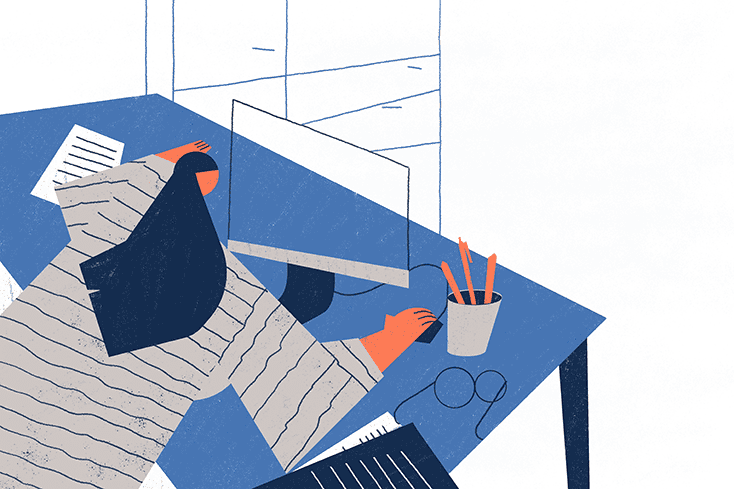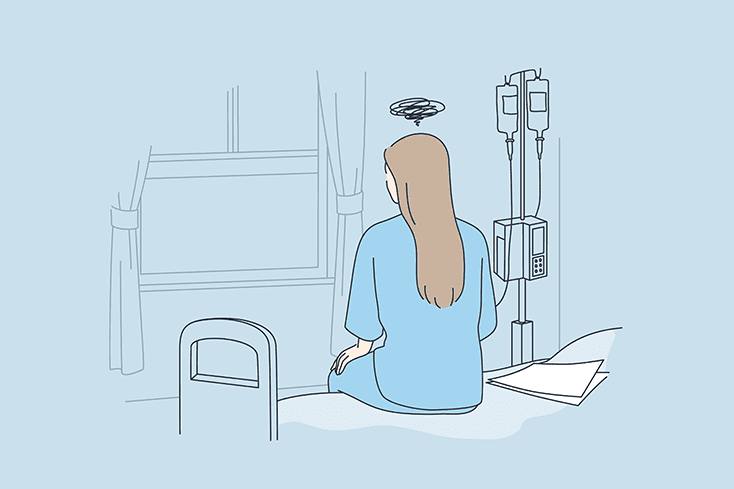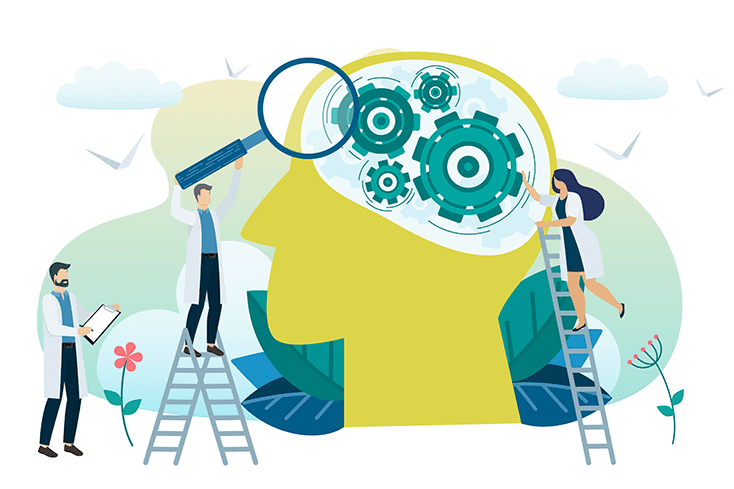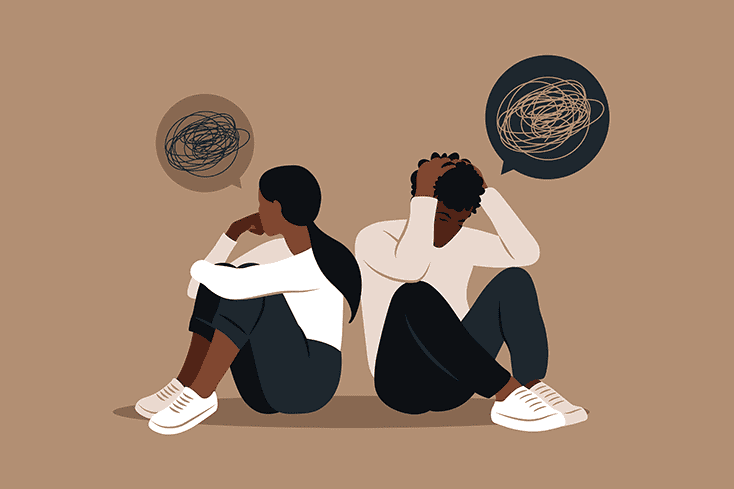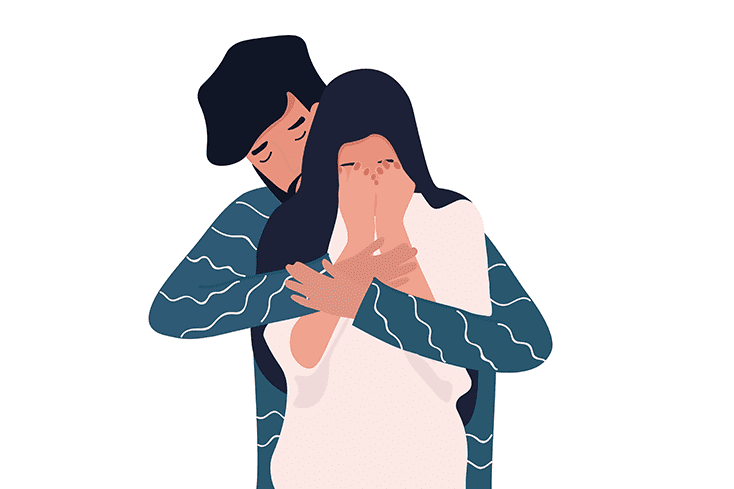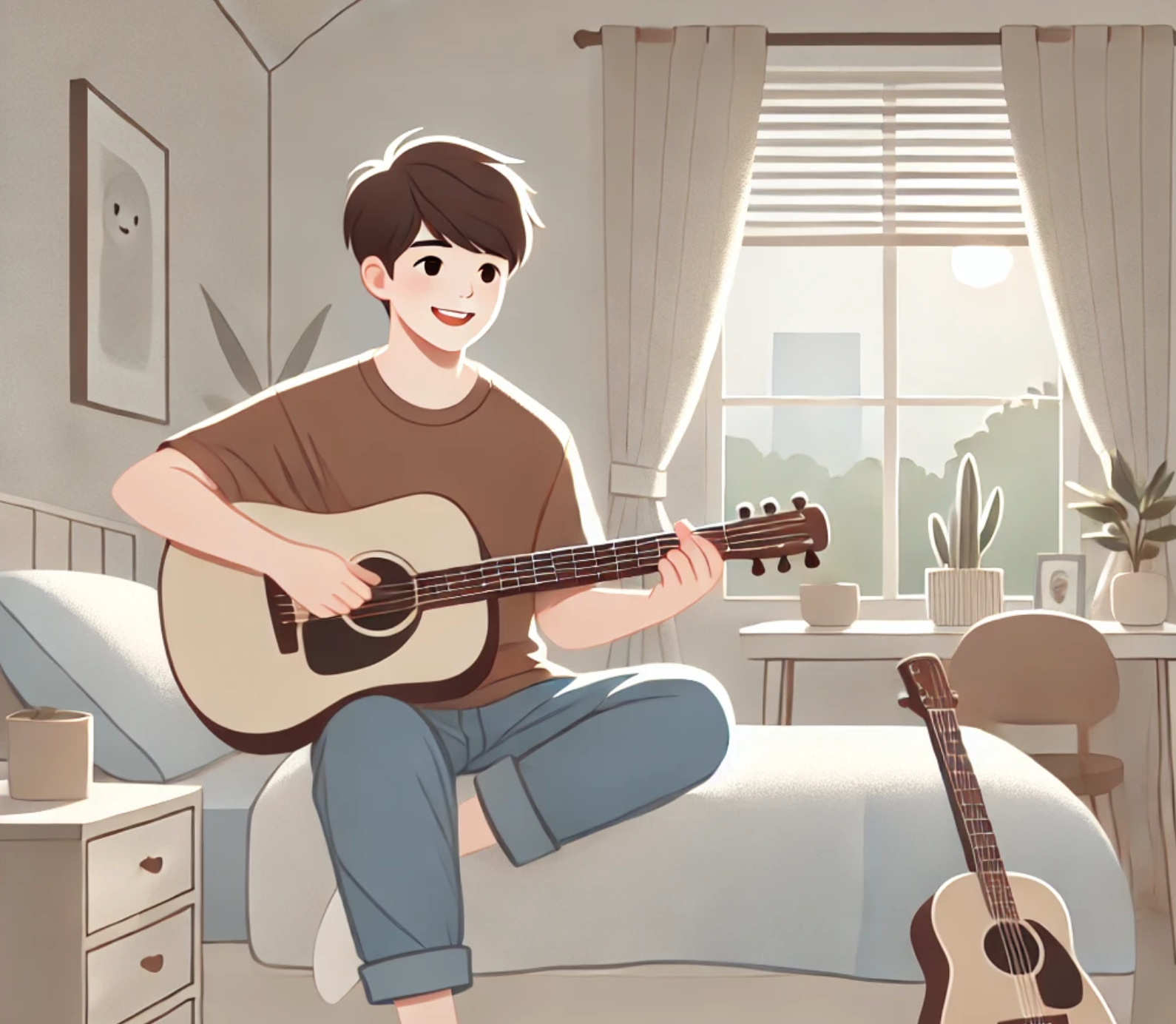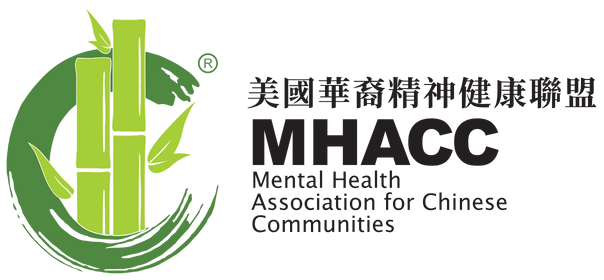彭一玲的故事 | The Story of Elaine Peng
MHACC 雙語部落格 Bilingual Blog
Scroll down for the English Version ⬇️
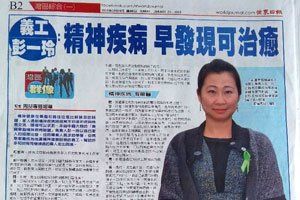
「美國華裔精神疾病聯盟」負責人彭一玲,從病患家屬成為推廣精神健康服務的義工,幫助許多和她有同樣境遇的華人走出困境。(記者周喆/攝影)
義工彭一玲:精神疾病 早發現可治癒
記者周喆
2016年1月24日
精神健康在華裔社區往往是比較禁忌的話題。家人遇到精神疾病時經常不知道如何與病患交流、哪裡可以求助。來自中國大陸的「美國華裔精神疾病聯盟」負責人彭一玲以自己家人的經歷出發,也向專業人員求助學習,從病患家屬成為推廣精神健康服務的義工,幫助許多和她有同樣境遇的華人走出困境。
記者問:妳有沒有精神健康專業方面的教育或者工作背景?
彭一玲答:完全沒有。我從中國大陸移民來美,在廣州和香港都居住過。以前從事進出口貿易工作,2005年開始在美國定居,做教育方面的工作。但是沒有接觸過精神健康方面的東西。
問:那麼,是怎樣開始進到精神健康社區裡頭?
答:那要從我先生的過世說起。我先生不是正常情況下去世。2012年他從美國回中國,不到一個月就在旅館裡出了意外。先生的死對我打擊很大。那時我精神差到連上車時要先邁哪一隻腳都搞不清楚。女兒曾對我說:「媽媽,如果爸爸還在,他絕不希望看到你現在樣子」。
過來人 走出幽谷
問:後來是怎樣走出先生去世的陰影?
答:他走了以後,我又遭到更大打擊:我女兒發病了。我自己也出了精神問題。有一次我坐朋友的車在高速公路上行駛。突然就覺得朋友開車太快,我受不了,要他開慢點。朋友已經將車速降到安全極限,我還是覺得他太快。我當時完全失控,臉色慘白,冷汗直冒。
朋友趕快把我送到醫院。經過檢查沒有發現身體有問題。我就意識到我可能精神出了問題。我要從困難中走出來,就要先過自己這一關,要敢於向專業人員求助。我接受治療後,確實狀況逐漸穩定。
本來我以為自己扛一扛也就扛過去了。後來發現還是需要專業人員的幫助。聽到很多抑鬱症病患訴說別人根本無法理解體會他們痛苦感覺,確實是這樣的。我希望大家能知道,在專業人士幫助、家庭理解支持下,最困難的一段一定能過去。只想靠自己「精神振作」起來,那是不現實的。
問:女兒後來得病也與她爸爸過世有關嗎?
答:是的。後來回想,我女兒當時已經有一些跡象。她連續十幾天都失眠,於是自己向學校輔導員和校長求救,說自己可能因爸爸過世受影響。學校方面只是讓她多運動鍛鍊。大家都以為事情就這樣過去了。沒想到過了七、八個月,我女兒就真的發病了。
我當時意識到,女兒發病的很多症狀都與我先生相似。我先生喝了20多年的酒,酗酒很嚴重。但以前我沒有意識到這屬於精神健康的問題。我先生生前從來沒有接受過精神健康治療。
後來,女兒的情況很嚴重,必須要進醫院治療。第一個醫生就對我說「你女兒的病症可能是遺傳的」,並問我們家的相關病史,包括我先生的酗酒史。我告訴醫生,我們一直懷疑我先生的死與酗酒有關,他死的時候旁邊就是酒瓶。
早發現 減少遺憾
問:先生去世和女兒發病讓妳有了哪些改變?
答:當時我很內疚,覺得自己太無知了,根本不知道先生可能有精神疾病,也不敢往這方面聯想。我先生是非常優秀的人,根本沒想到他會有這方面的問題。我女兒後來也說:「如果我早一點在爸爸還在的時候發病,我們就能救爸爸」。
回想起來,先生在世時已經有很多跡象,從大學時就開始了。但是20多年過去,沒人知道他身上發生了什麼事情,真的是很不應該。我一直都在反省,為什麼從來沒有從精神健康方面去想過他的問題。
那時我覺得普及精神健康知識太重要了。從2013年我開始接觸全國精神疾病聯盟(NAMI)。那時真是很困難,女兒經常要進醫院。她是很優秀的女生,因發病而改變很大,我也一度覺得沒有希望。我也不知道怎樣去處理女兒的事情。
剛好那時看到NAMI的家庭輔導課程,就去報名。透過上課才明白,原來精神健康問題是一種疾病。這種病找對正確的治療和藥物非常難,需要很長時間。如果中途放棄治療,會產生很多問題。社會上有些悲劇就與此有關。
問:女兒現在情況好很多了吧?
答:是的。現在她就像個正常孩子,能正常溝通。這是從那一次她的一句話開始的。
有一次我正在後院做園藝。女兒在我後面說:「媽媽,你為什麼不戴手套?」聽她這句話,我頓時淚流滿面。因為知道,我的女兒又回來了。
別人可能覺得奇怪我為什麼會有那樣的反應。因為我先生酗酒,我和女兒兩個人一直相依為命。她對我照顧得非常好。她很小的時候,有時我晚一點回家,她都會說:「你為什麼不打個電話回來,妳不知道別人會擔心嗎?」那時她才九歲。那些話本應該是媽媽對孩子說的。
以前我工作很忙,一周要工作七天。周末早晨她都給我做好早餐。她就是這樣表達著對媽媽的愛意。但是自從發病之後,她就沒有再照護我。所以那天她那樣一句看似很普通的話,我就知道女兒又回來了,她用的那些藥物在起作用,讓她又變成我以前知道的那個女兒。
精神疾病 有藥醫
問:你覺得社會對精神疾病的觀念需要作哪些改變?
答:社會上確實對精神疾病有些偏見,覺得病患很可怕。其實它就是一種病,因為腦部病症而導致病患行為改變。大家身體有病就會去醫治,腦裡有病怎麼就不醫治呢?
你看我們辦活動照片上那些女生都很漂亮吧,她們都是病患。如果有效控制,大家就應該鼓勵他們,只要保障治療,他們就是正常的,什至比別人還優秀。如果歧視他們,給他們貼上某種標籤,就適得其反。
有一次我在醫院裡看到女兒無法正常走路,真覺得天要塌下來了。後來透過上課知道,這是因為她服的藥物副作用引起肌肉張力不平衡,可以用其他藥物來緩解。可見治療過程中某些症狀不必緊張,有辦法解決的。
問:你是通過在NAMI上課而成為義工的?
答:是的。成為義工後,受過很多訓練。通過培訓發現,華人對精神健康真的所知什少,我自己就是很好的例子。20多年來我先生一直覺得自己很了不起、無所不能。但有時他又非常消極,什麼都不願意做。這其實就是很典型的躁鬱症症狀。但當時我們都不知道。如果那時他得到專業幫助,就不會發生後來的悲劇。
靠服藥 回復正常
問:你在NAMI做義工幫助過很多華人病患,有沒有比較難忘的經歷?
答:作為義工,當然希望自己的工作有成效。有一對夫妻,家庭關係很糟。太太經常為一點小事與丈夫吵架。但男方從來沒想到過他太太可能有精神方面問題。他們來找我們聯盟求助,說明他潛意識裡已經感覺到有問題。我就建議他們去找專業醫師檢查。
他們聽從建議去找精神科醫師。他太太開始服藥治療,三個月後家庭關係就有明顯改善。我很開心,告訴他們應該慶幸,因為知道問題出在哪裡,不像我不知道我先生的問題在哪裡。知道問題就去解決,是非常好的。但大多數家庭都不知道問題出在哪。
前不久還有一對夫婦的女兒發病,十幾天不吃東西。後來連水都不喝,奄奄一息。我們受過培訓都知道,這情況可啟動5150法案,報警啟動求助。但是那位先生堅持認為不是精神方面的問題。他們對向警察求助非常抗拒,覺得警察是專門抓壞人的。
專業人員也無法說服他們,轉向NAMI求助。後來我跟那位太太通了兩個小時電話,終於說服了她。我說的最重要一句話就是:「你們報警求助不是害女兒,而是為了要救她。她的生命體症已經很低,不能再拖延下去」。她馬上讓他丈夫打急救電話。結果我們這邊通話還沒收線,那邊急救人員已經到了。她女兒也得救了。
我們從支援小組那裡也得知道很多例子。常遇到病患抗拒服藥,不願去治療。我女兒也有這樣經歷。家人應該怎樣去幫助他們?有很多竅門要學。說服他們服藥能幫助回復到正常生活,對方通常都會願意。
還有位你見過的Frank先生,他們一家因兒子的病而遭受很大痛苦。夫妻最初到NAMI來求助時,頭都是低著的,講話也很消極,對孩子的未來完全茫然。我們讓他們知道,兒子的病可以慢慢控制,家長要改進溝通技巧。同時也要明確自己對兒子的希望是什麼。一年半下來,他們的家庭有了明顯改變。大家都能夠溝通,朝著同一目標去做。
看到病患臉上的笑容和恢復對生活的信心,就是我做義工的最大動力。
Elaine Peng, Director of Asian Community Programs of National Alliance on Mental Illness Alameda County South(NAMI ACS) with her own family's experiences, helps to promote mental health services and becomes a volunteer. She has helped many people in the Chinese community out of the same situation.
Zhou: Do you have any formal education or professional background in mental health?
Peng: No, not at all. I emigrated from China. I had lived in Guangzhou and Hong Kong before. I worked in the trading industry. In 2005, I moved to America to start my new life working in the education field. But had never been in contact with mental health issues.
Zhou: Then why did you start working in the mental health community?
Peng: I have to start with the passing of my husband. In 2012 he left the States to go back to China. Less than a month he died under abnormal circumstances. I was devastated and so upset that I don’t even know what I was doing. My daughter said, “If dad was here, he definitely would not want to see you like this.”
Freeing and extricate from a sad situation
Zhou:How did you get yourself out of this shadow of darkness after the passing of your husband?
Peng: After my husband passed away, I got another blow – my daughter got sick. I also realized that I have some mental health issues. One time, when my friend gave me a ride on the freeway, I suddenly felt that my friend was driving unbearably fast. I was all pale and sweaty, I told her to slow down but she told me she was driving at the speed limit. So she took me to the hospital. After the physical exam, nothing was identified. However, I realized that I may become mentally ill. I told myself, if I am going to overcome this, I need to be strong and seek help from the professionals. After I got the help I need, my illness got under control. I did think that if I could hang in there for a little while, I may be able to overcome it. But finally realized that professional help is very important. I heard stories that many people that have depression said that no one can understand the pain they go through, I found this to be true. I hope everyone knows that with the support from family and with professional help, you can overcome this difficult period. Just by battling on your own is not going to work.
I thought if I could hang in there for a little while I may overcome it by myself. But then, I realized that there was no way without help from the professionals.
I heard a lot of mental patients saying that no one on earth can understand how miserable they feel. I felt the same way when I didn't feel well. But at the same time, I hope to stress one point that with the help from professionals, with the understanding from your family members, you will overcome it. Don’t battle on your own when you can get so much support from the others.
Zhou: Was the illness of your daughter related to her father's passed away?
Peng: Yes, she started having symptoms after her father passed away. She couldn't fall asleep for 2 weeks. She was smart enough to realize there was some wrong about hers, so she contacted the counselor and the principal of her school. She thought perhaps her sleeplessness was due to the passing of her father. The school told her to exercise more so she will be tired enough to get some sleep. 8 months later when everyone started to think that the whole thing was over, my daughter became severely ill.
I realized that there were so many similar symptoms between my daughter and my husband. My husband masked his depression with alcohol over 20 years, however, I have never realized the fact that this kind of behavior is related to mental illness. My husband had never undergone any of mental illness treatment when he was alive.
Later on, the condition of my daughter became serious. She had to stay in the hospital. The first doctor told me that my daughter has inherited the illness from her father. He asked about our family history which included my husband’s alcohol abuse. I told the doctor that I was had often doubt about my husband's death that it was somehow related to the alcohol abuse because the wine bottle was sitting right next to him when his body was found.
Early detection, lessen regrets.
Zhou: What has changed you since the death of your husband and your daughter getting ill?
Peng: I felt guilty because of ignorance. I had no idea that my husband was suffering from mental illness and I am not willing to consider that side of the problem. My husband was a brilliant man so I would never even thought of him as having a mental problem. My daughter told me that, If we could have identified the illness before the incident happened, we could have had the chance to save him.
Thinking back, the symptoms already started when he was in the university. 20 years have passed and no one even knows what has happened. It’s a shame. I kept reflecting, why didn’t anyone ever think that his problem was mental health related.
Starting from that time, I realized promoting the knowledge of mental health is so important. Since 2013, I started working with NAMI. It was very hard for me at that time because my daughter was in and out of the hospital. She is an excellent girl student, her illness changed her a great deal. The illness changed her a lot. I was desperate because I didn't know how to handle the whole Situation.
In the meantime, I saw an advertisement for a NAMI family counseling course so I joined the session. After taking the course, I learned how to identify mental illness and finding the right medicine to tackle the problem is really difficult and time-consuming. If the person gives up in the middle of the treatment, it would cause a lot of problems. Many tragedies happened because the patients didn't have enough support.
Zhou: How is your daughter now? Is she better?
Peng: Yes, she acts normal and we can communicate like we used to do before.
That was the time when I was gardening and she came from behind and asked me why I was not wearing gloves. Hearing her saying something as simple as that but yet it is so like her before, my tears flowed down my face because I realized that my daughter is back!
Some people may wonder why I would have that reaction. My daughter and I have always supported each other ever since my husband’s alcohol abuse.
My daughter took good care of me! When she was very young and I came home late, she would say to me like: “Why didn’t you call?” “ Do you know that I would worry about you?” She was only nine and she said these words like a mother to her child.
I used to be busy at work. And have to work 7 days a week. My daughter would prepare breakfast for me on weekends, that's how she expresses her love for me. But after she was sick, she could not take care of me anymore. So when she showed her concern about me not wearing gloves. I knew that her medicine was taking in effect, my daughter was back again.
Mental illness is treatable with the right kind of medicine
Zhou: Do you think the concept of mental illness on society needs to be changed?
Peng: There is some bias toward mental illness in society. Some people may be terrified of mental patients. Actually, it is only an illness, the behaviors of people changed only because the illness affects their brain. We go to the doctor when we feel physically ill, it should be the same when the brain is ill.
When you look at the photos of our events, the girls are all beautiful. They are all mental patients but and their sicknesses have been properly controlled. Everybody should show their support towards these beautiful girls to that has overcome their illnesses. They are all brilliant as long as they undertake proper treatment. Discrimination creates a negative label effect which will only make the situation worse.
Once at the hospital, I saw my daughter couldn't walk properly, I felt really nervous. After taking the NAMI course, I learnt that it was because the side effect of the medicine she was taking made it difficult for her to control her leg muscle and balance when she walks. But the problem can be solved with other medicine. This tells us that we don't need to be too nervous about the malfunction during the treatment, it can be solved.
Zhou: Did you become a volunteer after you take the NAMI classes?
Peng: Yes, after becoming a volunteer, I took a lot of training. With all the training programs, I have learned that most Asians has very little knowledge about mental illness. I, myself is a good example. During the 20 years, my husband felt that he was flawless, but at the same time, he was also pessimistic. He was not willing to do anything. If he had the chance to get help from doctors, it would not end in tragedy.
Taking medicine can help a person resume back to a normal life
Zhou: Since you volunteer at NAMI for many years with many Chinese families, are there any memorable experiences?
Peng: As a volunteer, I certainly hope that what I am working on will have a positive effect. For example, there was a couple, they had bad relationships because the wife tended to take on a fight about some little things. Her husband never thought of a mental problem. Until the time they came to seek help from NAMI, he stated said that deep down inside, he felt something unusual was happening. I advised them to take the mental assessment with the psychiatrist.
They listened to my advice and his wife started taking medicine. 3 months later, there was a significant improvement in their relationship. I was delighted and told them they were very lucky. Because they had sought help from the professionals, not like in my case. It was a good way to try to find the problem and to solve it. But most of the families don't know what their true problem is.
Not long ago, there was a family, their daughter became sick. She could not eat or drink for more than 10 days, she was dying. Through the training programs, we all know that we can activate the 5150 act to call the police. However, the husband insisted that it was not about the mental problem. He resisted contacting police because he thought the policemen were "supposed to catch illegals".
When the professionals couldn't persuade them, they turned to NAMI. Then, I talked over the phone with the wife for 2 hours, I finally persuaded her. The most important thing I told her is that "You are trying to help your daughter when you call the police. What you do will never harm your daughter. You need to save her as soon as possible because her vital signs is becoming very weak. There is no time left." She made her husband call and the emergency personnel arrived and saved their daughter’s life.
We went through a lot of cases from the support group. We often come across patients who were unwilling to undertake treatment. My daughter had a similar situation before. There are a lot of skills for their family members learn in order to assist them. To persuade them taking medicine will help their loved one go back to their normal life, with this reason, most of them will be willing to do so.
Also, there is Mr. Frank that you have already met before. His family was suffering because of his son’s illness. When the couple came to NAMI to seek help, they always kept their heads down, you can literally tell the unhappiness from their talks. They felt hopeless for their son's future. We let them know that in fact their son's illness can be controlled. Parents need to be under control step by step, Parents need to improve their communication skills, they need to stay focus on what is best for their son. One and a half year later, there was improvement within their family, they all can communicate effectively again with the same goal.
Seeing the smile on the patients face, seeing them regain their confidence in life, are my motivation of being a volunteer.
